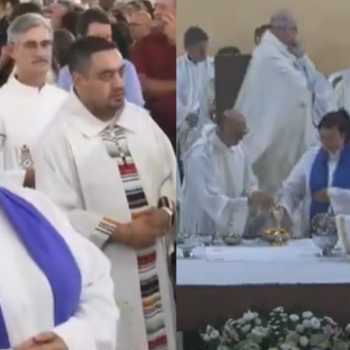Lectionary Reflections
Luke 16:19-31
September 29, 2013
Unlike other parables, this onedoes not stay in the realm of first-century village life. It spans this life and the next. It is realistic in its portrayal of the vast gap between rich and poor. The phenomenon of the poor waiting for crumbs at the doors of the rich is a detail taken straight from first-century life. It is strange in that the reversal of fortunes it depicts contradicts the widespread belief that wealth was a sign of God's favor and poverty a sign of sin. The story reflects the ancient belief that the righteous and the wicked can see each other after death.
The background of this parable is a tale from Egyptian folklore about the reversal of fates after death. It also has connections to rabbinic stories. In Greek the name Lazaros has the same root consonants as the name Eliezer who, Genesis 15:2 tells us, was a servant of Abraham. Some rabbinic tales feature Eliezer (Greek Lazaros) walking in disguise on the earth and reporting back to Abraham on how his children are observing the Torah's prescriptions regarding the treatment of the widow, the orphan, and the poor. Lazarus is a poor beggar (16:20); he returns to Abraham's bosom, and the rich man requests that Abraham send him as an emissary to his brothers (Lk. 16:28). (Donahue, 169-170)
This parable is found only in Luke. It underscores a theme expressed earlier in the Gospel (Lk. 1:52). God has "put down the mighty from their thrones, and exalted those of low degree." The story is a three-act play. The first act portrays the earthly contrast between the wealthy man and Lazarus. The second act describes the reversal of their conditions in the afterlife. The third act depicts the rich man's request to Father Abraham for a sign so that those still living can avoid his torment, a request that Abraham refuses.
First-century hearers of this parable would not have assumed that the rich man was evil and that the poor man was righteous. On the contrary, wealth in the ancient world was often viewed as a sign of divine favor, while poverty was viewed as evidence of sin. The rich man's sin was not that he was rich, but that, during his earthly life, he did not "see" Lazarus, despite his daily presence at the entrance to his home. The first time he ever sees Lazarus is when, from Hades "he looked up and saw Abraham far away with Lazarus by his side" (v. 23). (Donahue, 171)
As for Lazarus, we aren't told he was pious but his name means "God helps," which implies righteousness. Lazarus's hunger and willingness to eat whatever was at hand (Lk. 16:21) are reminiscent of the younger son's famished, desperate condition in Luke 15:16. (Boucher, 134)
The rich man calls Abraham his "Father." Earlier in Luke (3:8) we get the message that claiming a religious heritage cannot by itself gain us salvation. Living a life characterized by active compassion to others is a sign that we are responding to God's covenant. John the Baptist tells the crowds, "Bear fruits worthy of repentance. Do not begin to say to yourselves, 'We have Abraham as our ancestor'; for I tell you, God is able from these stones to raise up children to Abraham" (3:8).
What is it that causes some people to have something or someone in their line of vision and yet not really see them? And what causes others to both have someone or something in their line of vision and to really see them? What makes the difference between not really seeing and seeing? We have said that this parable is one of several in Luke that shows us that the kingdom of God shows up when and where we least expect it. We don't expect it to show up in the gap between the bearable, even pleasant, or luxurious living conditions of some and the unbearable, inhumane living conditions of others. We don't expect it to show up in the offer of the ability to see that gap and move from seeing to active compassion before it is too late. But we ought to have learned by now that the kingdom of God is not a prisoner to our expectations.
I mentioned earlier that the story of the Rich man and Lazarus reflects the ancient belief that the righteous and the wicked can see each other after death. If they are attentive to the presence of the kingdom of God, they can also see each other before death!
Sources Consulted
John R. Donahue, The Gospel in Parables: Metaphor, Narrative and Theology in the Synoptic Gospels (Philadelphia: Fortress Press, 1988).
Madeleine I. Boucher, The Parables (Michael Glazier, Inc., 1981).
Alyce M. McKenzie, The Parables for Today (Westminster John Knox Press, 2007).
12/2/2022 9:10:37 PM





